It’s only natural to face challenges in life, but when life’s difficulties come knocking at your door, do you take the responsibility for them, or do you blame everything and everyone around you?
When we have a victim mentality, we filter our entire existence through a paranoid narrow mental lens that is used to perceive other people and reality.
While it’s important to claim the role of a victim if we have genuinely been victimized or abused, we cannot move on with our lives unless we step out of the victim role and into the survivor role.
What is a Victim Mentality?
Victim mentality is a psychological term that refers to a type of dysfunctional mindset which seeks to feel persecuted in order to gain attention or avoid self-responsibility.
People who struggle with the victim mentality are convinced that life is not only beyond their control, but is out to deliberately hurt them. This belief results in constant blame, finger-pointing, and pity parties that are fuelled by pessimism, fear, and anger.
Simply put, having a victim mentality means that you blame other people and circumstances for the unhappiness you feel.
How Self-Victimization Develops
No one is born with a victim mentality, just as no one is born clinically depressed or anxious. Instead, the victim mentality is an acquired personality trait, meaning that it is the result of early life conditioning and coping mechanisms.
Most victims were victimized in some way as children, whether that was through physical abuse, sexual abuse, emotional abuse, or psychological abuse. Self-victimization can also develop through the codependent relationships we had with our parents, or simply by observing and adopting the unhealthy victim mentality exhibited by one or more of our family members.
However, although what happens to us as children is completely beyond our control, it is our responsibility as adults to step into our power and reclaim responsibility for our happiness.
Read 5 Signs That You Are A Victim Of Envy
9 Benefits of Being a Victim
Playing the victim actually has a number of juicy perks. These rewards make it very difficult to break out of such a mindset, which is why most victims seem to be so emotionally invested in perpetuating this type of toxic behavior.
Some of the perks include the following:
- Not having to take responsibility for anything
- Other people lavishing you with attention
- Other people feeling sorry for you
- Other people are less likely to criticize or upset you
- You have the “right” to complain
- You’re more likely to get what you want
- You feel interesting because you get to tell people all of your stories
- You don’t have to feel bored because there’s too much drama going on
- You get to avoid and bypass anger because you’re too busy feeling sad
Can you see some underlying patterns starting to emerge here?
Playing the victim actually gives you a lot of power: the power to avoid responsibility, the power to feel “righteously” sad, and persecuted, the power to avoid uncomfortable emotions, and the power to manipulate other people.
The Dark Side of Playing the Victim
The majority of people who play the victim do so unconsciously, or unintentionally. Even so, the victim role does involve a tremendous amount of manipulation and string-pulling. People in relationships or friendships with victims often report feeling like puppets who mold into whatever the victim believes they are or wants them to be.
Having other people feel sorry for you is an easy way to wrap them around your little finger. This unconscious craving to control others through their sympathies is really only a way for the mind to reinforce its belief in the “I’m a victim” ego identity.
There is a lot of comforts and artificial “safety” in playing the victim’s identity. Not only does it reward you with not having to take responsibility for any of your behavior (because “other people” are always responsible), but it also prevents you from feeling uncomfortable emotions like guilt and anger, while at the same time making you feel “cared for” by others.
Playing the victim is also often used by abusive and/or sociopathic people who use this role to keep a tight emotional leash on those close to them.
For example, a narcissistic person might constantly put down their partner, then fixate on the one time their partner snapped and called them a “monster,” making it seem like they are in fact the “abused one.” Or a physically abusive person might use the excuse that they “always have to put up with the other person” as a reason for beating up their partner.
As we can see, the “poor me” attitude can be used on both sides of the human spectrum: both seemingly “normal” people and more extreme and dysfunctional psychopathic people. For example, in codependent relationships, self-victimization can be used by the enabler and the abuser, and sometimes both at the same time in a kind of power struggle.
There is no one “type” of person that fits into the victim role, so it’s wrong to say that only narcissists or sociopaths adopt this role. I have personally seen all types of people play this role: from sweet old grandmothers to teenagers, mothers, fathers, professionals, and even “spiritually awakened” people.
23 Signs of the Victim Mentality
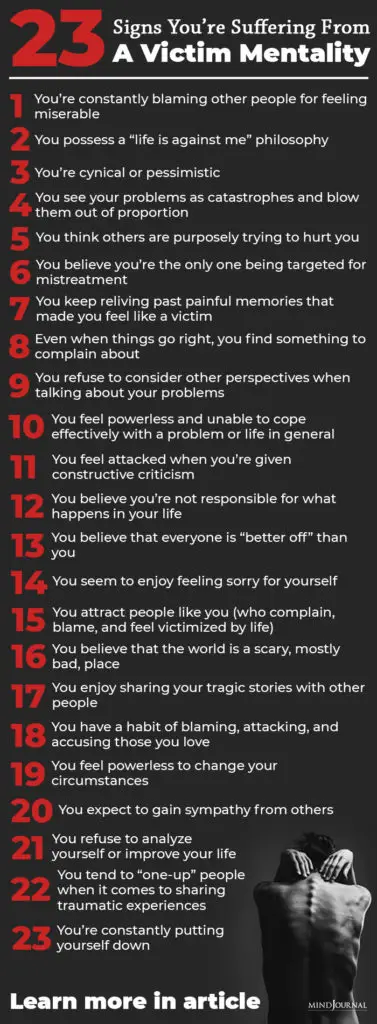
Are you, or is someone you love, playing the victim? Here are some common signs to look out for:
- You’re constantly blaming other people or situations for feeling miserable
- You possess a “life is against me” philosophy
- You’re cynical or pessimistic
- You see your problems as catastrophes and blow them out of proportion
- You think others are purposely trying to hurt you
- You believe you’re the only one being targeted for mistreatment
- You keep reliving past painful memories that made you feel like a victim
- Even when things go right, you find something to complain about
- You refuse to consider other perspectives when talking about your problems
- You feel powerless and unable to cope effectively with a problem or life in general
- You feel attacked when you’re given constructive criticism
- You believe you’re not responsible for what happens in your life (others are)
- You believe that everyone is “better off” than you
- You seem to enjoy feeling sorry for yourself
- You attract people like you (who complain, blame, and feel victimized by life)
- You believe that the world is a scary, mostly bad, place
- You enjoy sharing your tragic stories with other people
- You have a habit of blaming, attacking, and accusing those you love for how you feel
- You feel powerless to change your circumstances
- You expect to gain sympathy from others, and when you don’t get it, you feel upset
- You refuse to analyze yourself or improve your life
- You tend to “one-up” people when it comes to sharing traumatic experiences
- You’re constantly putting yourself down
As we can see, the permanent sense of being a victim is deeply destructive both internally, and externally.
How to Stop Being a Victim
If you’re reading this article because you suspect that you might be clinging to a victim mentality, here are some tips that can help you step out of this toxic role:
1. Start replacing “you” with “I”
For example, instead of saying “you make me feel so angry,” you can replace that statement with, “I feel so angry when I hear you say that.” This simple trick can help you learn to take more self-responsibility for your happiness.
Read The Truth About Victimhood That Can Heal and Set You Free
2. See yourself as a survivor
A victim argues with life, a survivor embraces it. A victim dwells in the past, a survivor lives in the present. A victim believes they’re helpless, a survivor takes back control over their life. Although the victim mentality is addictive, the survivor mentality is much more empowering in the long term.
Once you start seeing yourself as a survivor, you’ll begin to feel better about life and you’ll attract other people for the right reasons. Listening to a survivor is much more refreshing and inspiring than listening to a victim wallow in self-pity.
3. Be kind and compassionate towards yourself
In other words, be careful about becoming a victim of being a victim! This role isn’t something you choose: you developed it as a result of childhood conditioning. Be gentle with yourself and practice self-love.
Explore your core wounds and core beliefs that compound your victim identity, and replace self-loathing with self-compassion. If you’re struggling to get past the victim role, practice self-care by seeing a therapist. Experiment with practices such as journaling, affirmations, NLP, CBT, and other forms of self-love.
4. Explore your mistaken beliefs
Mistaken beliefs create anxiety, depression, anger, and blame. A lot of these beliefs are lodged in the shadow side of our psyche, and can only be explored through deep shadow work. You will probably be stunned by how many types of mistaken beliefs you have unknowingly adopted!
5. Ask “What thought is creating this suffering?”
All suffering originates in beliefs that go unquestioned and unexamined in our minds. When we attach to these thoughts, we suffer. Remember that you don’t need to believe the thoughts in your head: thoughts are simply fluctuations of energy that we assign meaning to. Practicing meditation can help you notice how transient thoughts are.
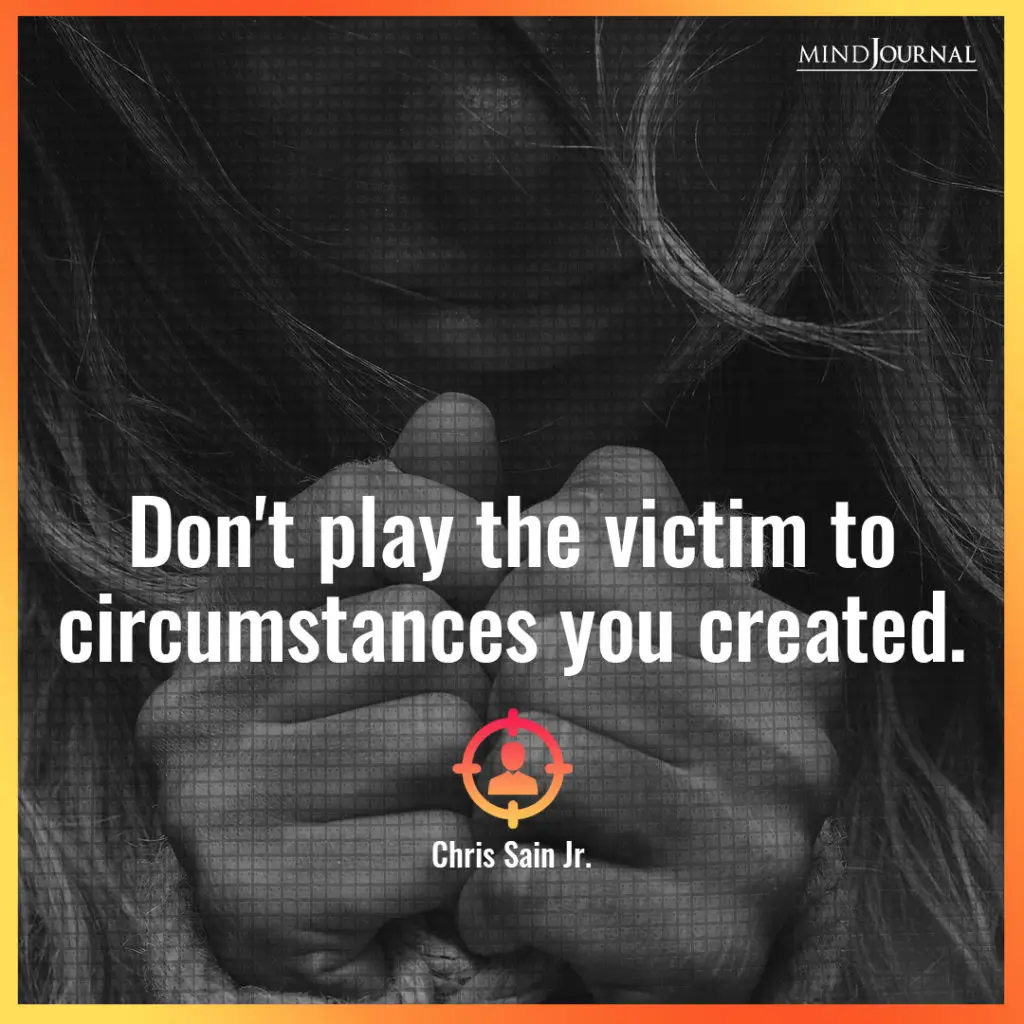
6. Practice being thankful
Gratitude is a simple but powerful way to remind yourself that life is not as miserable as you perceive it to be. Each day, try to find ten things that you’re thankful for. You might like to keep a gratitude journal in which you write these ten things down, or simply name them mentally. Try to feel sincerely thankful for having these things.
Read 5 Reasons Playing the Victim After Your Breakup Will Hamper Your Healing
7. Affirm self-responsibility
Start to notice all the ways you bypass self-responsibility. Be ruthlessly honest and examine how gaining sympathy from others makes you feel special and continues the cycle of pointing the finger at others.
You might like to use an affirmation such as “I am responsible for my life” or “I am empowered to create change” to help you reprogram this unconscious need to play the victim. You might also like to do something that builds your confidence and actually shows you that you’re capable … or reflects on something in the past that you overcame successfully.
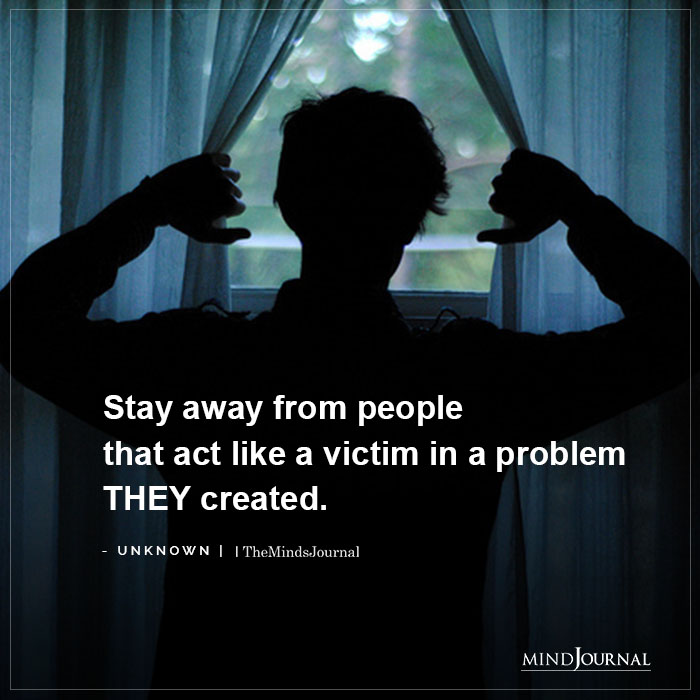
8. Perform an act of kindness for another
When we play the victim we tend to be solely focused on ourselves. Get yourself out of your head by doing something nice for another person you love. Realizing that you can feel good without manipulating another person is an important way to cut the addiction the self-victimization.
How to Deal With the Victim Complex in Other People
We’ve all met those people who are perpetually moping and complaining about their lives. These people seem to carry around the belief that the world is against them and appear to almost enjoy feeling miserable. In the field of psychology, these people are referred to as individuals who suffer from a victim complex; a type of neurosis that revolves around obtaining pity from other people.
Read Have You Been the Victim of Narcissistic Triangulation?
What is a Victim Complex?
The victim complex is a mindset that develops through life and is triggered mainly through childhood conditioning. People who suffer from the victim complex perpetually see themselves as the victims of other people or circumstances. This warped self-perception leads to the desire to gain affection and attention from other people while simultaneously avoiding self-responsibility and blame.
What is the Difference Between Victim Mentality and Victim Complex?
They both sound so similar … so what is the actual difference? While both can (and do) overlap, the victim mentality is more of a common issue. Most people struggle with a victim mentality at one point or another during life.
The victim complex, on the other hand, is an insidious and deeply rooted behavioral pattern that defines a person’s entire outlook on life. Unlike the victim mentality (which generally tends to be short-lived), the victim complex can define a person’s life for years, even an entire lifetime.
In other words, the victim complex is far more serious and pathological than the victim mentality.
14 Signs of the Victim Complex
People suffering from the victim complex will display a large percentage of the following symptoms:
- They will constantly put themselves down
- They will blame other people or situations for feeling miserable
- They’ll refuse to analyze themselves in order to feel better about life
- They have a “life is against me” philosophy
- They feel powerless or helpless to change their circumstances
- They think others are purposely trying to hurt them
- They enjoy sharing their tragic stories with others
- Even when things go well, they still find something to complain about
- They believe that the world is a mostly bad and dangerous place
- They get upset and reactive when given constructive criticism
- They believe that everyone is “better off” than them
- They tend to blame, attack, and accuse those they love for how they feel
- They see their problems as catastrophes and blow them out of proportion
- They don’t take responsibility for their happiness
I realize how frustrating living with, working with, or simply being around a self-proclaimed victim can be. I have dealt with my fair share of those struggling with victim complexes, but the important thing to remember here is that these people are genuinely suffering as a result of their mindset.
These people genuinely believe that they are helpless and are at the complete mercy of other people and life. This learned helplessness is not developed as a way of manipulating you (although it can be used that way), it was developed as a result of early life abuse.
So it’s important that we show compassion to the people in our lives suffering from victim complexes, without of course enabling their warped self-perception.
How to Deal With Self-Proclaimed Victims
So the question now is, how can you deal with victims without hurting them?
Handling those who struggle with the victim complex can be tricky, particularly because direct confrontation only reinforces their sense of being persecuted. Here are some tips that might help you:
1. Don’t get sucked into their feelings
Remember that victims are unconsciously seeking attention and validation. However, when you grant what they want, you will become emotionally entangled with them, which is bad for both you and them.
Try to be a passive listener, without actively involving yourself in their pity party. Remember that they will look to you for sympathy as a way of reinforcing their victim mentality, but don’t give it to them. Simply remain neutral, unless you decide to practice point 3 (below).
2. Make it their problem
Victim complex sufferers will always find a way to pin blame and responsibility onto another person as a way of bypassing self-responsibility. They will also try to get you to agree with them to bolster their sense of feeling “right.” Instead of agreeing, express how much confidence you have in their ability to handle the situation as mature adults.
3. Agree wholeheartedly
This practice uses a little bit of reverse psychology: go along with their resistance completely so that you completely blow the problem out of proportion. So if the victim is saying how terrible their life is at the moment, agree with them: life truly is awful and horrendous for them. This tactic can cause the victim to change their tune, saying, “well I guess life isn’t that bad …”
Read 5 Reasons Playing the Victim After Your Breakup Will Hamper Your Healing
4. Don’t give advice
The truth is that victims don’t want to solve their problems, because that would undermine their sense of being victimized! Therefore giving advice to them is equivalent to speaking to a wall: you’re wasting your breath. When victims seek “advice and counsel” what they’re really wanting is evidence that you care. This is the sad thing about victims: they confuse pity with love.
Try practicing these pieces of advice and you’ll find that the victim either starts taking responsibility for their life or seeks sympathy elsewhere. Either way, you won’t have to be the victim’s “victim” anymore.
Finally, don’t forget that a victim complex is a form of mental illness. Keep an open and compassionate heart, but don’t be an enabler.
The victim mentality and victim complex are truly insidious and destructive forms of behavior – they taint friendships, ruin relationships, and destroy your self-esteem. But through applying the advice in this article, hopefully, you will feel inspired and empowered rather than victimized by what is happening to you.
Do you struggle with the victim mentality? Or perhaps you have a loved one or colleague who suffers from the victim complex. Feel free to share and vent below!
Written By: Mateo Sol Originally Appeared On: Lonerwolf Republished with permission.

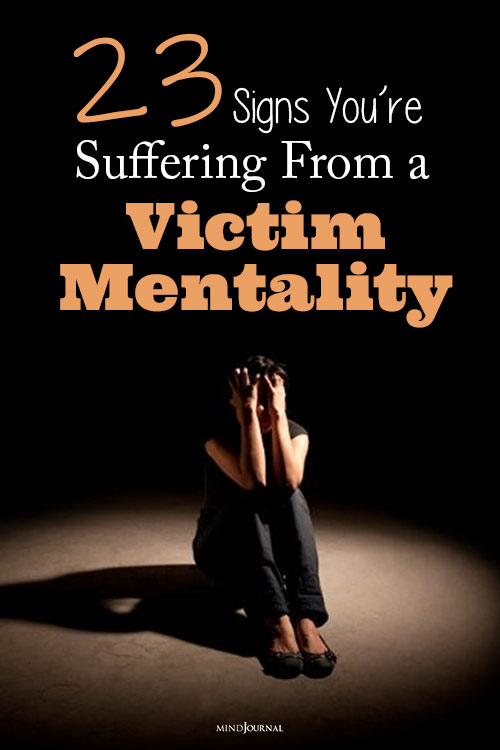
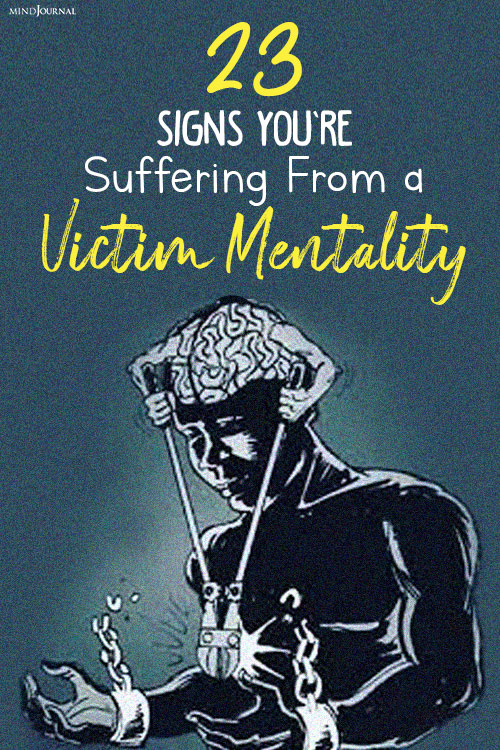
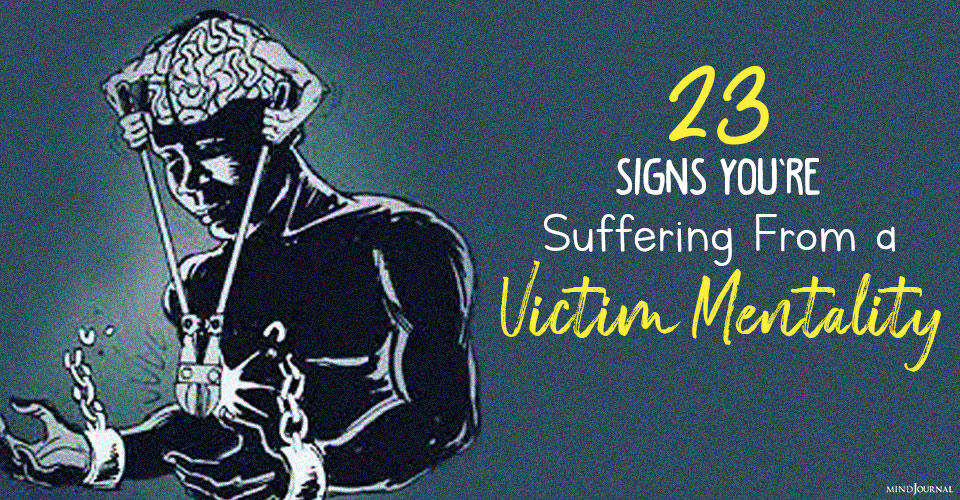







Leave a Reply
You must be logged in to post a comment.